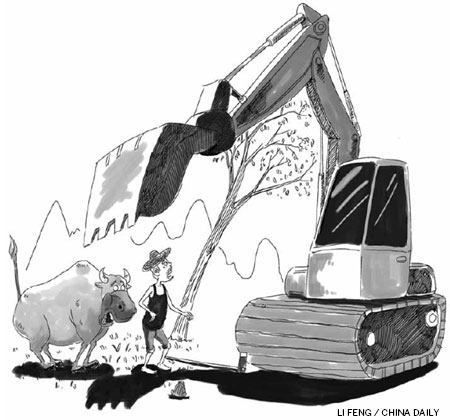


China is home to a time-honored and rich agricultural civilization, characterized by harmonious economic and ecological values. The rich heritage of traditional agriculture, and the harmony it has established between humans and nature can be used to develop modern agriculture in an eco-friendly way. Villages that practice age-old farming traditions are also the standard bearers of diverse ethnic cultures.
But some important agricultural heritages are being destroyed or neglected thanks to rapid urbanization, fast-paced economic growth, and the spread of modern technology. So, proper protection is needed to prevent traditional villages from the impending doom.
A study conducted by Chinese Village Culture Research Center on traditional villages with historic, ethnic or architectural values across 17 provinces shows on average eight such villages have disappeared every five days between 2004 and 2010. This begs the need for striking the right balance between exploitation and protection of farmland in the process of urbanization, which should be based on respect for traditional agriculture.
The government has to take a series of moves to promote traditional agricultural values in order to better protect these villages. It should conduct a thorough survey on agricultural heritages to get a comprehensive view of the size, type, distribution and condition of the country's traditional agricultural villages. This will help it take specific and targeted protection measures based on the systematic classification of the villages.
And since sustained protection of important agricultural heritages cannot be ensured in the absence of relevant laws and supervision mechanisms, the government has to enact specific laws to this effect. Perhaps an amendment to the Agriculture Law will be needed to fulfill this requirement.
Besides, protection and development of agricultural heritages are not possible without financial help, so the government has to allocate funds for the purpose. In fact, governments at all levels have roles to play in providing financial and policy support to protect traditional agricultural practices and in guiding enterprises and NGOs in playing their part in the endeavor.
The basic aim of the players engaged in the endeavor, however, should be to ensure that the self-development of the "heritage" villages, especially the benefits accrued from local industries' production, and ecological and cultural development, can ultimately become the main source of the funds needed to protect them.
 Microsoft revamps Surface to challenge Apple
Microsoft revamps Surface to challenge Apple
 Highlights of AOPA-China Fly-In air show
Highlights of AOPA-China Fly-In air show
 Car Free Day to fight air pollution
Car Free Day to fight air pollution
 Liaoning carrier completes its furthest sea trial
Liaoning carrier completes its furthest sea trial
 798 Art Festival kicks off in Beijing
798 Art Festival kicks off in Beijing
 Intl comic festival 'Comicopolis' held in Buenos Aires
Intl comic festival 'Comicopolis' held in Buenos Aires
 Highlights of CIAPE 2013
Highlights of CIAPE 2013
 2013 China International Auto Parts Expo kicks off in Beijing
2013 China International Auto Parts Expo kicks off in Beijing